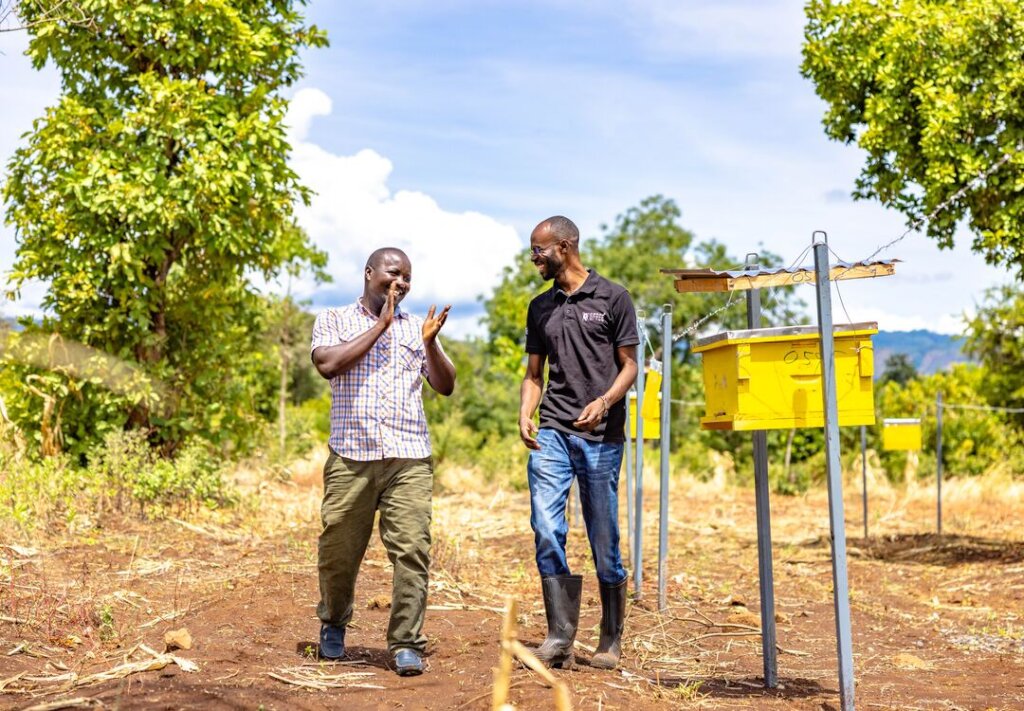By Jennifer Cruse | Project Leader
Born Free is helping farmers and elephants live together without conflict, thanks to innovative and cost-effective natural solutions.
Last year, Born Free constructed an initial ten beehive fences in communities around Meru National Park. The Born Free team are currently constructing an additional ten beehive fences, bringing the benefits of this project to more crop farmers, helping to protect elephants and people across the landscape.
In the matter of a few minutes, an elephant can destroy the only source of livelihood that a subsistence farmer has: their crops. The cycle of planting and waiting, hoping that your crops can make it through tough droughts and pests, just for an elephant to wipe out your farm is a debilitating process.
Understandably, this hasgenerated widespread hostility toward elephants as they’re viewed as a threat to their livelihoods. Many farmers already face extreme economic challenges, and each crop-raiding event threatens to push them into severe poverty.The negative perception of elephants makes them extremely vulnerable to retaliatory harm and even killings. Such conflict is a significant threat to elephant populations in Meru and throughout Africa, representing a barrier to conservation efforts for elephants and wildlife in general.Thankfully, there is a potential solution to this situation: beehive fences.
What are beehive fences? The innovative method was developed by Dr Lucy King of Save the Elephants, who observed that elephants naturally avoid bees – imagine the pain of bees stinging the inside of your trunk or the soft tissue around your ears!The design incorporates locally constructed beehives, which are strung intermittently between metal poles to compose a simple fence. When elephants bump into the fence and disturb the hives, the sound and threat of bees cause elephants to flee. It is a simple idea, but ingenious and highly effective at deterring elephants.
Since the ten beehive fences were built at the beginning of 2023, farmers involved in the project have reported very few cases of elephants raiding crops. Many farmers in the area have learnt about the project andare keen to use beehive fences to protect their crops. In response, Born Free are currently in the field, working with the farmers and transporting the equipment needed to buildthe ten new beehive fences.
The team have learnt from and adapted the fences constructed last year. This year, they will dig deeper and wider holes for the fence posts to prevent the fences from leaning. Furthermore, the number of beehives that each farmwill receive has been increased from 12 to 15 beehives, along with the number of posts. This will lend even greater protection from crop raiding elephants around the perimeter of the farms. Each farm receives 30 hives in total, of which 15 are beehives and 15 are dummy hives. This means a total of 150 beehives and 150 dummy hives will be installed across the ten farms.
Through the harvesting and sale of honey, this technique provides farmers with a sustainable source of income, further showing them the benefits of conservation and promoting peaceful coexistence. Additionally, since a greater variety of plants will increase the bee population, we hope this will inspire locals to increase the variety of plants and even reforest areas around their farms.
Born Free are learning more every day about the elephants of Meru and what methods might work to foster coexistence. More than anything, our team is learning from the communities around Meru, who have an immense amount of traditional beekeeping knowledge and are bringing new insights into the project all the time. Utilising local knowledge and biodiversity to tackle conservation’s big problems, like human-elephant conflict, offers a key to success.
The team will be closely monitoring the farms to measure how effective the fences are at reducing human-elephant conflict, safeguarding the future for the elephants of Meru.
Links:
By Natalie Blachford | Project Leader
By Natalie Blachford | Project Leader
Project reports on GlobalGiving are posted directly to globalgiving.org by Project Leaders as they are completed, generally every 3-4 months. To protect the integrity of these documents, GlobalGiving does not alter them; therefore you may find some language or formatting issues.
If you donate to this project or have donated to this project, you can receive an email when this project posts a report. You can also subscribe for reports without donating.
Support this important cause by creating a personalized fundraising page.
Start a Fundraiser
